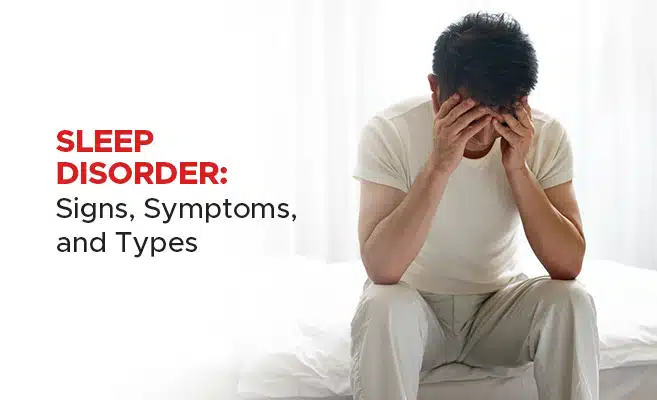
Introduction of Sleep Disorders
We spend roughly one-third of our lives asleep, yet many of us rarely stop to question how well that sleep actually rejuvenates us. While occasional restless nights are normal, when poor sleep becomes chronic, it may be a sign of a deeper issue: a sleep disorder.
Sleep disorders encompass a wide range of conditions that disrupt normal sleep quality, timing, or duration — and can profoundly impact your physical health, mental well-being, and daily performance. In this blog, we’ll peel back the layers on what sleep disorders are, why they happen, how to tell if you have one, and what practical paths there are toward recovery.
Let’s journey into the world of nights we rarely see — and take back our rest.
What Exactly Are Sleep Disorders?
A sleep disorder (or sleep–wake disorder) refers to any condition that impairs one or more of these aspects:
- The quality of sleep (how restorative it is)
- The timing (when you fall asleep, when you wake up)
- The duration (how much total sleep you get)
- Wakefulness and daytime alertness
Put more simply: if your sleep leaves you feeling perpetually drained, foggy, or “not quite alive,” a sleep disorder might be in play.
There are more than 80 recognized sleep disorders, but many people are most familiar with a handful of common ones such as insomnia, sleep apnea, and restless legs syndrome. Millions of people across the world suffer from chronic sleep problems that often go undiagnosed and untreated.
Why Sleep Disorders Matter
You might shrug off a few bad nights, but when sleep dysfunction lingers, the consequences can cascade throughout your body and mind:
- Cognitive & Mood Effects: Poor sleep worsens memory, concentration, and mood regulation. It may lead to anxiety or depression.
- Physical Health Risks: Chronic sleep problems are linked to obesity, type 2 diabetes, hypertension, heart disease, stroke, and a weakened immune system.
- Accidents & Safety Risks: Drowsy driving and workplace errors increase dramatically with poor sleep.
- Reduced Quality of Life: Persistent fatigue and low energy can strain relationships, decrease productivity, and lead to burnout.
In short: sleep disorders don’t just disrupt nights — they affect every corner of your waking life.
Types of Common Sleep Disorders & Their Signs
Here’s an overview of some of the most common and clinically significant sleep disorders:
| Category / Disorder | Core Problem | Key Symptoms / Clues |
| Insomnia (Chronic) | Difficulty falling asleep, staying asleep, or waking too early | Takes more than 30 minutes to fall asleep, frequent awakenings, non-restorative sleep, irritability |
| Sleep Apnea (Obstructive / Central) | Repeated pauses in breathing during sleep | Loud snoring, choking or gasping, morning headaches, excessive daytime sleepiness |
| Narcolepsy / Hypersomnia | Excessive daytime sleepiness and sudden sleep attacks | Uncontrollable sleep episodes, cataplexy (sudden muscle weakness), vivid dreams |
| Circadian Rhythm Disorders | Mismatch between internal clock and external demands | Difficulty sleeping or waking at conventional times, jet lag, shift work sleep issues |
| Parasomnias | Abnormal behaviors or experiences during sleep | Sleepwalking, night terrors, acting out dreams, sleep talking |
| Restless Legs Syndrome (RLS) | Uncomfortable leg sensations causing movement | Urge to move legs, worse at night, disrupted sleep |
What Causes Sleep Disorders?
Sleep disorders rarely have a single cause. They often arise from a combination of biological, psychological, environmental, and lifestyle factors.
1. Biological & Neurological Causes
- Imbalances in neurotransmitters like GABA, serotonin, and dopamine.
- Dysfunction in brain regions that regulate sleep and wake cycles.
- Genetic predispositions (e.g., narcolepsy and restless legs syndrome).
- Structural abnormalities in the upper airway that lead to sleep apnea.
2. Circadian Rhythm Disruptions
- Irregular light exposure due to shift work or excessive screen time.
- Frequent time-zone changes or inconsistent sleep schedules.
- Staying up late and sleeping late on weekends (“social jet lag”).
3. Behavioral & Lifestyle Factors
- Poor sleep hygiene (late-night screen use, inconsistent routine).
- Caffeine or alcohol close to bedtime.
- Lack of physical activity.
- Chronic stress and anxiety.
4. Medical & Psychological Conditions
- Depression, anxiety, and bipolar disorders often worsen sleep.
- Chronic pain, respiratory or cardiac diseases, and hormonal imbalances.
- Obesity, diabetes, and thyroid problems.
Sleep disorders can also create vicious cycles — poor sleep causes stress and fatigue, which in turn worsen sleep quality.
How Sleep Disorders Are Diagnosed
If you suspect a sleep disorder, proper evaluation by a sleep specialist is essential. The diagnostic process often involves:
1. Detailed Sleep History
Your doctor will ask about bedtime routines, sleep quality, daytime symptoms, caffeine use, medications, and stress levels. Keeping a sleep diary for a week or two helps identify patterns.
2. Sleep Questionnaires
Standard tools such as the Epworth Sleepiness Scale or Insomnia Severity Index help measure sleep quality and daytime sleepiness.
3. Polysomnography (Sleep Study)
This overnight test measures brain waves, oxygen levels, heart rate, breathing patterns, and muscle activity to identify disorders like sleep apnea or parasomnias.
4. Home Sleep Apnea Test
A simpler, at-home version used for suspected sleep apnea cases.
5. Actigraphy
Wrist-worn monitors track movement and light exposure to detect circadian rhythm disturbances.
Treatment & Management Strategies
The good news? Most sleep disorders are treatable once the root cause is identified. Treatment usually involves a combination of behavioral, medical, and lifestyle modifications.
1. Improve Sleep Hygiene
Start with the basics — small habits that make a big difference:
- Maintain a regular sleep schedule, even on weekends.
- Keep your bedroom cool, quiet, and dark.
- Avoid caffeine, alcohol, and heavy meals before bedtime.
- Turn off screens at least an hour before bed.
- Use your bed only for sleep and intimacy.
- Get regular exercise and exposure to daylight.
2. Cognitive Behavioral Therapy for Insomnia (CBT-I)
CBT-I helps reframe negative thoughts about sleep and trains your body and mind to relax naturally. It’s considered the gold-standard treatment for chronic insomnia.
3. Positive Airway Pressure (PAP) Therapy
For sleep apnea, CPAP or BiPAP machines keep the airway open during sleep, improving oxygen levels and reducing symptoms.
4. Medications (Under Supervision)
Depending on the condition:
- Short-term sleeping aids for severe insomnia.
- Stimulants or wake-promoting agents for narcolepsy.
- Dopamine agonists for restless legs syndrome.
- Melatonin supplements for circadian rhythm adjustments.
5. Light & Chronotherapy
Timed exposure to bright light in the morning or evening can help reset your biological clock. This is especially useful for shift workers or those with delayed sleep phase disorder.
6. Relaxation & Mindfulness
Meditation, deep breathing, and progressive muscle relaxation reduce stress and help signal your body that it’s time to rest.
7. Treat Underlying Medical Conditions
Managing chronic illnesses like diabetes, thyroid disorders, or anxiety can dramatically improve sleep quality.
Real-Life Examples
Sara, a 35-year-old IT professional, worked night shifts for years. She couldn’t sleep until 4 a.m. and felt exhausted all day. Diagnosed with Shift Work Sleep Disorder, she improved after optimizing her light exposure, adjusting meal times, and following a consistent schedule.
Rahul, 42, struggled with loud snoring and constant fatigue. His wife noticed pauses in his breathing at night. A sleep study confirmed obstructive sleep apnea. With CPAP therapy and weight loss, his energy levels and focus improved within months.
Priya, 29, had severe insomnia due to anxiety. After undergoing CBT-I, she learned relaxation techniques and reestablished healthy sleep routines — finally enjoying deep, restorative rest.
Tips for Better Sleep Health
- Don’t ignore sleep issues lasting more than a few weeks.
- Stay consistent — same sleep and wake times daily.
- Track your progress in a sleep diary.
- Avoid late-night doom scrolling or work.
- See a specialist if snoring, excessive fatigue, or other symptoms persist.
- Remember: Good sleep is not a luxury — it’s a necessity.
Conclusion
Sleep disorders are far more than just “a few sleepless nights.” They are complex health conditions that affect the brain, body, and mind. The key lies in recognition, evaluation, and consistent treatment.
When managed properly, sleep disorders can be reversed — leading to sharper focus, better mood, improved health, and a more energized life. So if you’ve been battling fatigue or restless nights, take the first step today. Seek professional help, adopt healthy sleep habits, and reclaim your nights of peace and rest.
References / Further Reading
- Sleep Disorders – NCBI Bookshelf / StatPearls: https://www.ncbi.nlm.nih.gov/books/NBK560720/
- Sleep Disorders: Pathogenesis and Therapeutic Interventions – PMC: https://pmc.ncbi.nlm.nih.gov/articles/PMC11892028/
- Chronic Insomnia – StatPearls: https://www.ncbi.nlm.nih.gov/books/NBK526136/
- Sleep Disorders: Types, Causes, Symptoms & Treatment – Cleveland Clinic: https://my.clevelandclinic.org/health/diseases/11429-sleep-disorders
- Common Sleep Disorders in Adults: Diagnosis and Management – AAFP: https://www.aafp.org/pubs/afp/issues/2022/0400/p397.html
- Sleep Deprivation and Chronic Disease – CDC: https://www.cdc.gov/pcd/issues/2023/23_0197.htm



